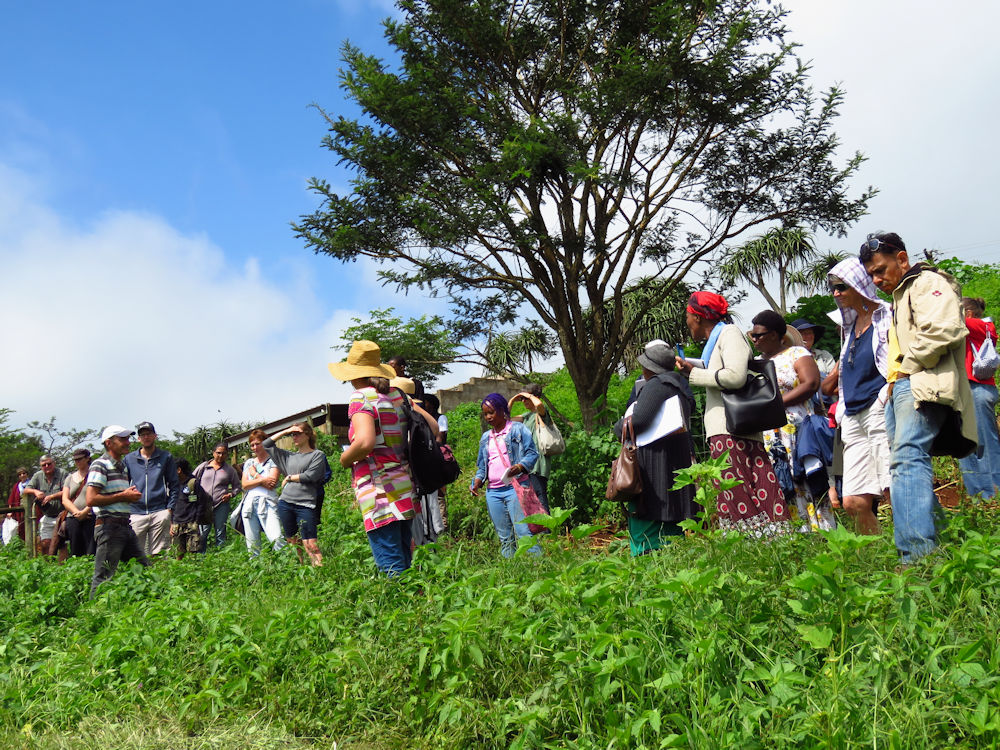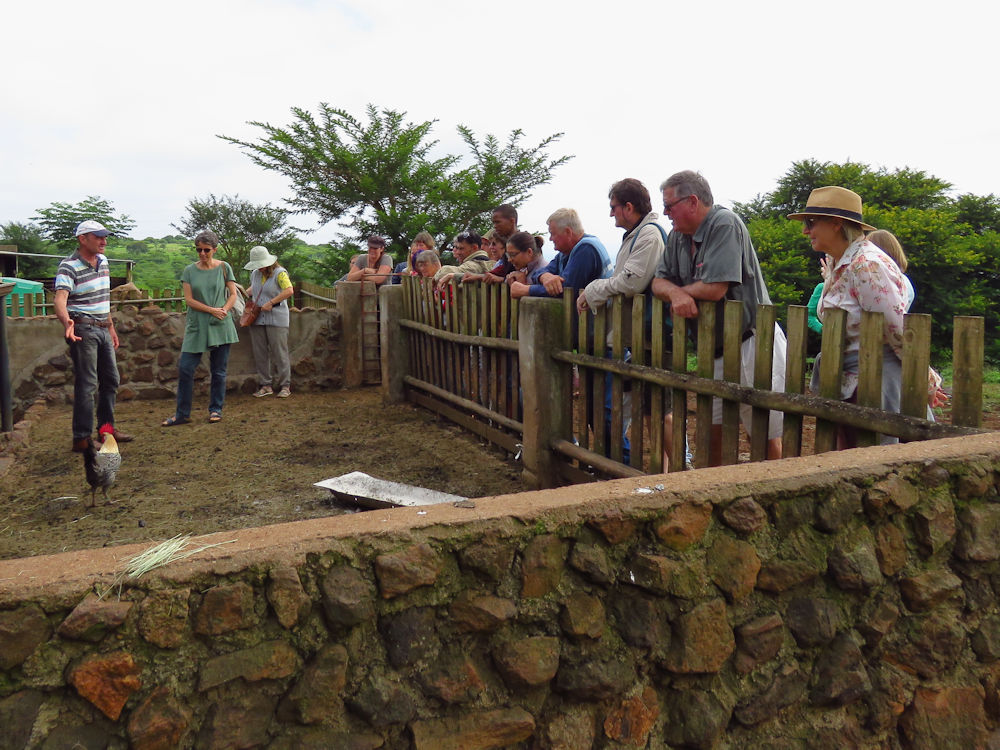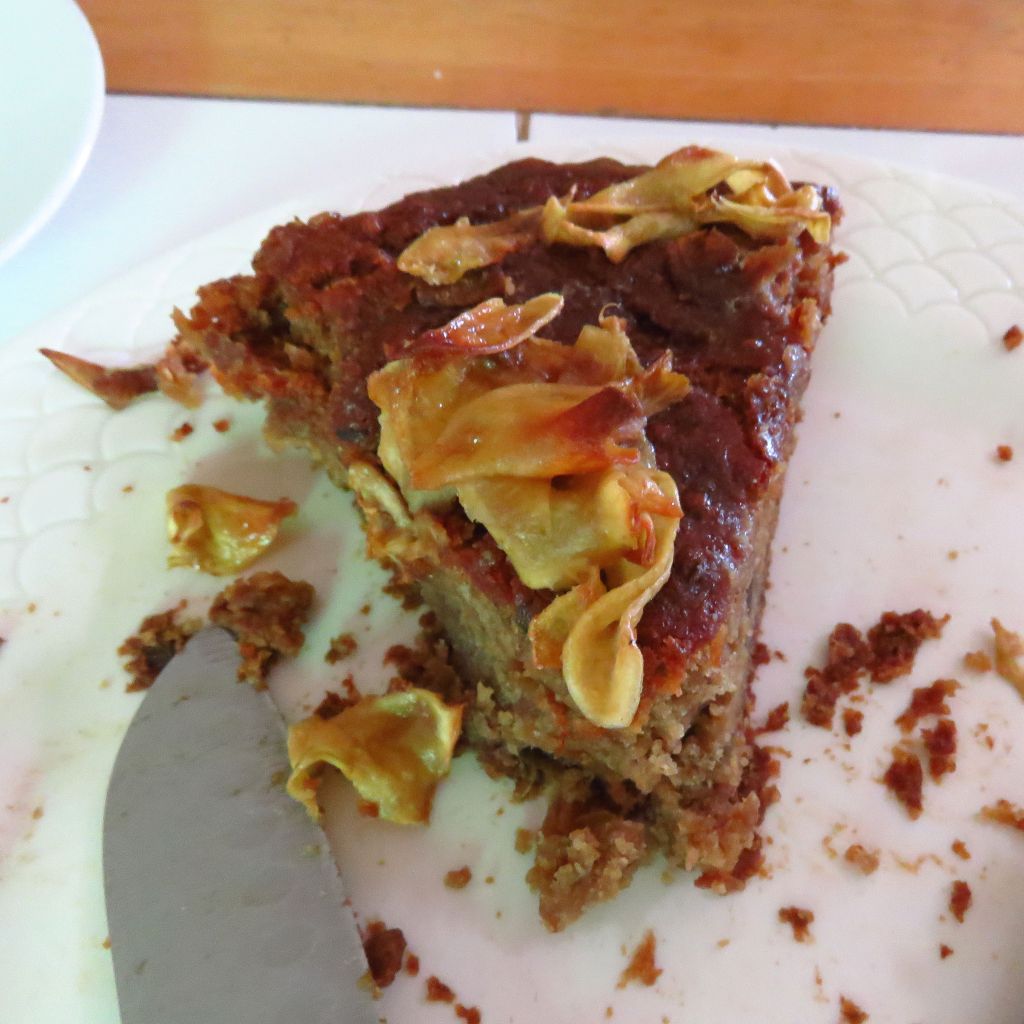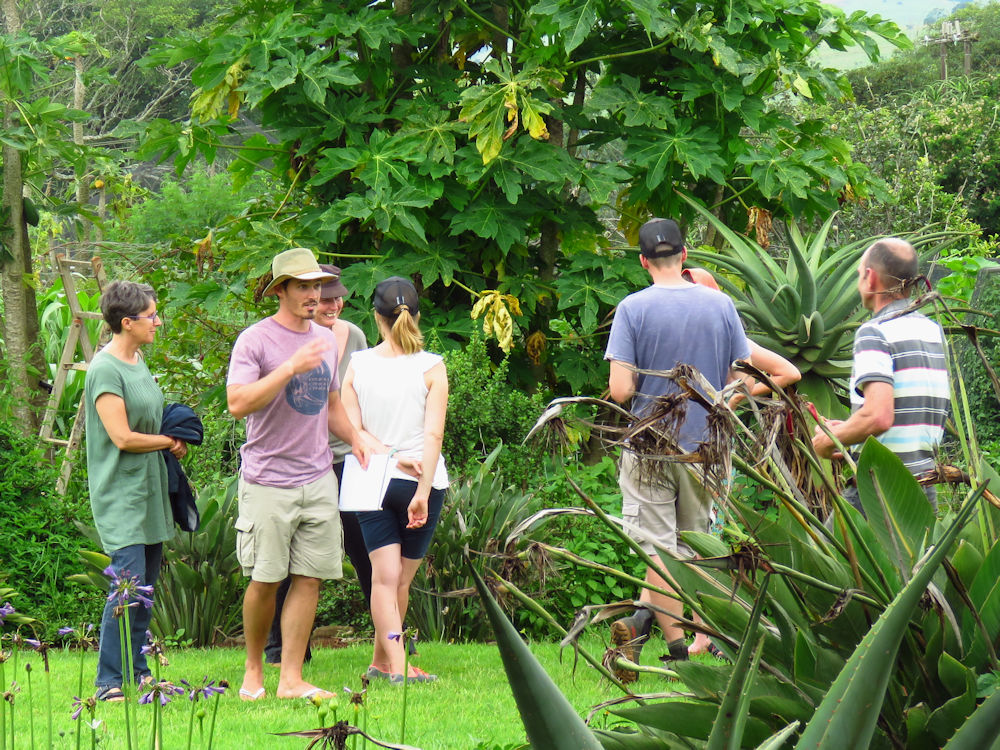The Slow Food movement, started 30 years ago in reaction to the introduction of fast food outlets in Italy, is flourishing in the Midlands right now.
The principles of Slow Food are good, clean, fair food for everyone – something that is abundant in the Midlands. Richard Haigh of Enaleni Farm outside of Pietermaritzburg, was one of the founding members of Slow Food in KZN, so it was fitting that the 2020 Slow Food year began with a visit to his agroecological farm. The Slow Food communities of Durban were invited to join us. Richard is part of the Community of Midlands Regenerative Producers, seen here hiding behind his sign!

The initial aim of Slow Foodhttps://www.slowfood.com/ was to defend regional traditions, good food, gastronomic pleasure and a slow pace of life. Today Slow Food represents a global movement involving thousands of projects and millions of people in over 160 countries. Slow Food envisions a world in which all people can access and enjoy food that is good for them, good for those who grow it and good for the planet. The food production and consumption systems most common today are harmful to the earth, to its ecosystems and to the people that inhabit it.
Richard Haigh of Enaleni Farm, epitomises Slow Food. “I’m drawn to Slow Food because it tries to fix all that is broken in the world – all the disconnection between people, our food, our systems. Slow Food encourages people to take responsibility for the safeguarding and recovery of our diversity in a practical way, encouraging us to eat, taste, share, listen to the differences and celebrate them. That is something extraordinary and deep, and I think sets Slow Food apart from other organisations and initiatives. Slow Food is rooted in practice. It is practice which makes Slow Food so powerful – the value of keeping traditions alive, the conviviality, cooking traditional dishes, sharing seeds, techniques of food transformation, poems, music, stories – it is all in the doing, not just theories.”
Luke Foster declared “Richard himself is a rare breed. May we conserve his knowledge and spread his story. What a privilege to have him on our doorstep.”
The day began slowly (of course) with introductions, before heading out to the 10ha farm to meet some of the animals who live there.

Richard is passionate about reviving interest in hardy heritage breeds, which have evolved and adapted to local conditions, to safe guard their genetic diversity and resilience. His animals have all their teeth, tails, testicles, beaks, horns and toenails intact – removing them is standard practice in industrial agriculture.
The mixed farming system of plants and animals present visitors with an opportunity to ponder the relationship between animals, plants and a non-industrialised approach to landuse and food production.
Bridget Ringdahl commented “Richard is an exceptional example of what I would love to believe all farmers are. His care and compassion for his animals (note: not livestock) is real and essential for achieving the possible – that is good, honest, sustainable and fair farming.”

Jack, the rescue donkey, came to greet us. Jack is being trained to do some farm work in return for his keep in this place of abundance.
Tinks Wiendl thought the excursion a wonderful surprise as she had no idea what to expect. “It was so amazing to see the relaxed, loved animals. This is how all food should be produced! I loved all the special details found in unexpected corners, nooks and crannies.What a treat to meet such an inspirational, but also down to earth farmer.” Kim Wiggett agreed “A lovely morning spent with like minded people, learning from such a knowledgeable person.”

His herd of Zulu sheep are a mottled lot, with different markings, shaggy hair, tiny ears and very fat tails. “If they stored fat around their bodies, they would battle in the heat,” he told us. He doesn’t vaccinate or dip his herd, but ‘spot dips’ when necessary and regularly clips their hooves, to prevent their toes spreading as they walk and providing places for ticks to hide. The flavour of the meat is extraordinary – probably a combination of the breed, a varied diet and the fact that they are not full of chemicals.

His herd of Nguni cattle are usually dipped in October, but of course, with the late rains, this season is different. They were happily foraging in the paddock. Blossom (the cow who provides all the single origin dairy products of Enaleni Farm) and her adorable calf Petal, posed for photos.

The large spotted Koelbroek pigs have an interesting history. Believed to have been shipwrecked in 1778 on a voyage from China and swum ashore. “Pigs really do work for you in a garden,” Richard said, “ideal for a small scale farm as they have many uses, including cleaning up a field of unwanted plants and producing many offspring.” At Enaleni the pigs eat lots of macadamia and pecan nuts, easily cracking the hard shells, and forage under the fruit trees – a wide and varied diet. In times past, pigs with a lot of fat like this breed, were highly prized – the fat being used for candles and soap.

Richard keeps a number of rare and unusual breeds of fowl – including the endangered Campine from Belguim and the hardy Potchefstroom Koekoek bred in 1959 – which are both good layers and great eating.

There are some interesting turkeys on the farm too – including the American Mammoth Bronze which is endangered. To be classed as a heritage breed, birds need to be able to fly, mate naturally and sit on eggs, things which no longer happen in industrial agriculture (artificial insemination and incubated eggs). There are also two kinds of rabbit (used for meat) at Enaleni – Chinchilla and New Zealand Red which are kept on the ground. When they have offspring, they go into cages to keep them safe and secure. Chicken tractors with other interesting breeds of chicken dot the lawn – Buff Orpingtons, Venda and Sebrights.

Tamara Mork-Chadwick had heard about Enaleni for a long time, so was thrilled to visit at last. “The experience was fresh, yet so familiar. Wonderful to see all these different foods produced on one small farm. It takes one hell of a lot of physical hard work, experience and know how. Topped off with the finest of delectable teas. A truly magical, down to our roots, Earthy morning.”
Richard does not remove the indigenous vegetation to create pastures, he plants many more varieties of trees and shrubs (like aloes and Leonotis) to provide food for birds and bees. The fruits of many trees are included in his famous Eataleni feasts held once a month on the first Sunday. Syzigium cordata (umdoni) berries become olives, and the flower stalks are used as a substitute for cloves. The wild medlar (umthulwa, Vangeria infausta) makes a great Asian style dressing and the wild figs are used in ice creams and cakes. Many of the ‘weeds’ are eaten (like amaranth) and the seeds of Pancium maximum grass are collected for biscuits and cakes.
Kare Brown appreciated Richard enthusiastically and passionately sharing his wealth of knowledge and experience about how a farm can be managed by working WITH nature rather than against it. “Whether food or weed, everything is accepted and managed. It’s the respect for Mother Earth that was truly heartwarming.”
For many years, Richard has grown heritage maize and saved seed to ensure it is GMO-free. On Enaleni, they only weed the maize field once in a season, placing all the weeds at the base of the plants as mulch. With such fertile soil (all that manure and companion plants), there are not many pests. To combat stalk borer, Richard mixes 1 cup of wood ash with 3 cups of fine sand and sprinkles that down each stalk. This season, the drizzly weather has prevented the stalk borer moths from flying and laying eggs. Weaver birds can be a problem, but by keeping many weeds in the system for them to eat, he minimises the damage. Julia Colvin was impressed by Richard’s knowledge, “He has a deep understanding of the different systems and how to pull it all together holistically, which he is able to explain in a no-nonsense, eloquent way.”

Bridget Krone was also impressed. “One of the things I’ll remember most from this visit to Enaleni (apart from the cakes, the rich, black, fertile soil and the pretty poultry), was Richards attitude to ‘pests’. He ‘manages’ the monkeys, birds, stalk borer and weeds – rather than trying to ‘solve’ them. There’s never a ‘final solution’, just a constant use of his wits and an acceptance that he will always win-some, lose-some.”
Before tea, Richard talked about the value of simple hand tools. They are very versatile, often did the job better and at a fraction of the cost of the machinery that many farmers have become entranced by. While they may be hard to come by these days, Derrick Martin told us to check out the selection of hand tools online at Johnny’s Selected Seeds.
Breadmaker Sarah Derret, found Richard and his way of living, completely inspiring. “In our fast paced, consumer driven, short cut world, Enaleni is a model that we can all aspire towards. To be able to look at what is on hand and find ways to use it is highly commendable and so completely right. Like grass seeds added to scones muffins or bread. I personally loved the idea of growing on site, milling on site and then baking/cooking on site. The whole deal with absolutely no steps in between.”
Teatime! No one expected this part of the excursion to be such a highlight. Hermine Spies, who does not usually eat cake, enthused, “The cakes were to die for. Especially the one with amaranthus seed, orange, gooseberry, and lampranthus.”
Richard likes to use whatever is growing abundantly in his cooking – seasonal eating at it’s best. There were lots of just dug up sweet potatoes, some figs on the wild fig tree, so he dreamed up a delectable combination using these, topped with salted caramel. There were two types of carrot cake – one drizzled with basil infused syrup, single cow (thanks Blossom) yoghurt and lemon zest. The other used roasted macadamia nuts and lebkuchen spices. Perfect scones, with exceptional butter, completed the feast.
Over tea, there were lots of conversations about our food systems, the state of the planet, recipes shared and new friends made. Lihle Mavuso said that she is so glad to be part of a Slow Food Community. “It’s been good to learn about sustainable ideas on gardening, and that you don’t to have plenty to add value to life. I liked the simplicity of agroecology. I want to look for other opportunities to gather more information about this.”
Megan Woods “Richard’s energy and passion for food, animals, growing plants, was a unique and insightful look into how farming can be. Inspirational on so many levels. “
Mlu Kanyile “Today was full of inspiration. I learned that everything is living in the Internet, I can learn so much online – like Richard has. Now I’m thinking of making a documentary as a young organic farmer.”
Judy Jordaan “Wow. What an unspoilt piece of heaven, run by a passionate man. I loved the energy of Enaleni.”
Many of today’s visitors vowed to return to Richard’s exceptional Eataleni lunches after tasting his baking.
Kait and Andre Kauerauf so enjoyed the farm tour. “We would love to be able to sit and have a glass of wine with Richard – he is so knowledgeable but doesn’t take things too seriously, which is refreshing. We were inspired to see the different ways of raising animals and growing vegetables as well as the time, care and attention to detail that goes into so much of what happens at Enaleni. We especially admired the lengths Richard goes to to preserve seeds and breeds. And then to top it all off… the cakes! With delicious produce from the farm! What a delectable treat!”
After tea, we explored the vegetable garden. Richard had given us advice about growing sweet potatoes – instead of planting the runners straight, curl them into a loop and plant on a mound. There are five varieties of potatoes at Enaleni – each one with a different purpose and flavour. Pumpkins wind all over the place, minimising the risk of pumpkin fly which would be attracted to a large field planted with pumpkin only. There are many bean varieties including zebra beans and rattlesnake pole beans climbing trellises and arches. African horned cucumbers trail beneath tree tomatoes, coriander, carrots and sunflowers are left to go to seed. A place of abundance. Lindiwe Phikwane was thrilled at all the new knowledge, particularly the tip to discourage monkeys by not planting fruit trees on your boundary, rather closer to the busier areas of the farmyard.
Pam Haynes was grateful for the opportunity to visit Enaleni again. “We arrived a bit shocked due to a near accident on the way. Shaken and giving gratitude we absorbed the calming vibe of Enaleni. It was lovely to be in the fields, to smell the soil and the dung and learn so much. Thank you Richard for a real education about the way we can live our lives with creativity and compassion.”
Carol Addis “It was fabulous to see everyone from our Slow Food communities make the effort to be at the outing. Richard was an amazing host, both with all the interesting information he happily shares, and the fantastic spread at tea time! We could not have asked for more from him. New friends were made, ideas shared and we all left with loads of information. What really encouraged me was that overgrown ‘weeds’ all have their place and uses in our own gardens of abundance.”
Slow Food unites the pleasure of food with responsibility, sustainability and harmony with nature. Enaleni Farm epitomises these values with a generosity of spirit that you don’t often come across these days. Everyone can contribute to improving the food system through their individual behaviour. Through your food choice, consumption becomes part of the productive act and the consumer thus becomes a co-producer.
Khara-Jade Warren loved every moment, “The few hours spent with Richard at Enaleni Farm were some of the most inspiring and enlivening I’ve had in some time. The minute you set foot in this special microcosm, you can feel the passion and deep-rooted connection radiating from every nook and cranny, both inside and out. Richard himself, though he moves incredibly fast for a slow foodie, embodies the principles of care and attention, and is like a walking (and sometimes darting) encyclopedia of food and farming knowledge. The tea treats we had, from moist cakes and grenadilla cordial, to fresh homemade yoghurt and jams, were all dense with the energy of the place, and I left feeling as though I’d been communing with pure joy.”
Slow Food Durban’s Delwyn Pillay, who brought some special seeds from a recent trip to the DRC to share, thanked Nikki Brighton for organising and Richard Haigh for hosting the gathering of Slow Food communities of the Midlands, Mafakathini, Mpophomeni and Durban. “Enaleni is nestled between Pietermaritzburg and Durban, and offers a lovely halfway spot for such gatherings. The gathering was a great opportunity to meet and connect with Slow Foodies of the respective KZN communities made up of diversity of cultures, genders and ages. The youngest member is 12 year old Caldun Pillay. For some it was their first time meeting other Slow Food members from other communities. A great day connecting and forging new friendships. Cheers to many, many more future gatherings! Viva!”
For more information about Slow Food in KwaZulu-Natal contact slowfoodmidlands@cowfriend.co.za

























Inspirational!
LikeLiked by 1 person
It certainly was.
LikeLiked by 1 person
What an interesting read. I am a bit envious of Tinks and Julia who attended! Nikki, thank you for your beautiful and informative writing.
LikeLiked by 1 person
You would love Enaleni. x
LikeLike